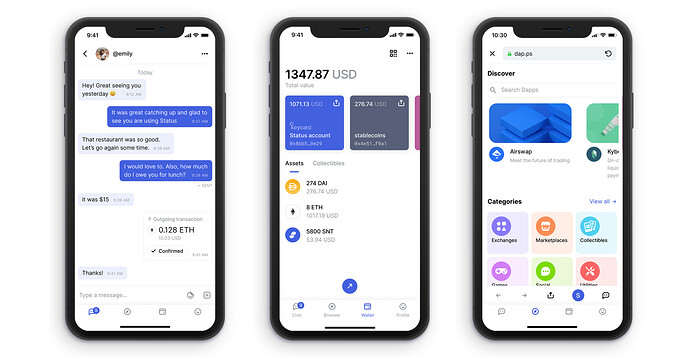Over the past 20 years, the internet as we know it has been controlled by a few corporations, with an incentive to collect and sell data. Status provides an alternative. Status uses state of the art technology to provide private, secure communication. Status uses a peer-to-peer model that prevents any 3rd party from controlling users’ data. Status combines a messenger, crypto wallet, and web3 browser and gives you full control over your assets and communication.
Most messengers offer end-to-end encryption. This standard protection means that the company providing the service can not read the content of your messages. But the flow of information over their network is public, and allows for interpretation of who is talking to whom, from where. Traditional messengers also require identifying information to sign up, like a phone number, and this is usually connected to a host of other personal data about you. Status requires no personal information whatsoever for you to get started. Because of its peer-to-peer infrastructure, Status has no knowledge about who is contacting whom, nor about the content of your messages. Here you can find specifications of how this technology works.
The Status App is the beginning. Independent financial capabilities, private & secure communication with no backdoors or servers to confiscate, and fundamental dapp integration".
The Status App is more than just a messenger, it is a private messenger & a Web3 browser & also a Non-Custodial wallet.
- Reference: Status - Frequently Asked Questions
(Let’s add all the content below to the comment. If you post it, I will add comments)
@Andrew wrote a well detailed blog post on our.status.im that compared Telegram, Status & Signal.
One of the comparisons discussed was Encryption
For many people, a secure messaging app is naturally synonymous with an encrypted messaging app. Telegram is something of an anomaly in that respect, because, despite its popularity and reputation, messages aren’t end to end encrypted by default. It has a “secret chat” option which must be manually selected on a per chat basis. Having to remember to start conversations with non-default options is far from ideal. Secure messaging app defaults should be privacy preserving - as they are in Status and Signal.
What’s more, is that Telegram’s encryption was developed “in house” by the Telegram team. This is something that’s often considered bad practice in cryptography circles. To top it off, although their clients are open-source, their server implementations are not – which means they cannot be openly audited.
Signal’s encryption was developed publicly by professional cryptographers and has garnered much admiration. It’s been so successful, in fact, that it’s been adopted by many high profile messaging clients in the space. Its client and server implementations are completely open source.
Status has done well to integrate the same encryption algorithms as Signal under the hood - albeit with some “adaptations” to suit their decentralized infrastructure. Their client, protocol, and peer-to-peer back end code is all open source. What’s more: Status is developed by an entirely open organization, so following along with design decisions and development goals is a genuine possibility.
Status is E2E encrypted by default & also open source.
What else do you think makes Status different from other Messengers?
Feel free to drop in the comments!!
